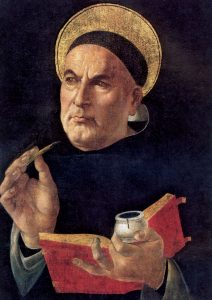In 1218 Peter Nolasco, Raymund of Pennafort and James I, King of Aragon (in Spain) founded the Order of Mercy for the ransom of captives held in slavery by the Saracens and Moors in North Africa and parts of Spain. King James of Aragon even gave the Order his own coat of arms as its emblem.
About 600 years later in 1827, Mother Catherine McAuley founded an Order in Ireland with the same spirit; these women became known as the Sisters of Mercy.
The Sisters of Mercy provided nursing, education and care for the poor in the industrial cities of the 19th century, rescuing them as it were, from a different kind of slavery; from sickness, poverty and ignorance. The Sisters of Mercy came to Edinburgh and taught in a number of city schools where the children were from poor Catholic families. The children’s need for schooling and the need for more Catholic teachers were desperate, and so in 1856 Mother Mary Agnes founded the St Thomas of Aquin’s College for the training of Catholic teachers.

St Thomas’ expanded as children aged five and upwards were welcomed. In 1905 the Higher Grade Department of school, where ‘Secondary Education’ was provided, was officially ‘recognised’ by the then Scotch (!) Education Department. However, St Thomas’ still retained its ‘Primary’ Department until World War II.
From 1939 to 1975 only girls were taught in the school but in 1975 the doors were opened once more to boys and the school was given its own catchment area in the city. The Sisters adapted the ancient coat of arms given to the ‘saints’ who had originally founded the order of Mercy for the school’s badge, and so our badge dates back to those Crusaders of the 13th century.
Thomas was born in 1226 the seventh child of the youngest son of Count Landulf of Aquino. The philosophy of St Thomas Aquinas has exerted enormous influence on Christian theology, especially that of the Roman Catholic Church, but also Western philosophy in general. His most important and enduring works are the “Summa Theologica”, in which he expounds his systematic theology of the “quinquae viae” (the five proofs of the existence of God), and the “Summa Contra Gentiles”.





